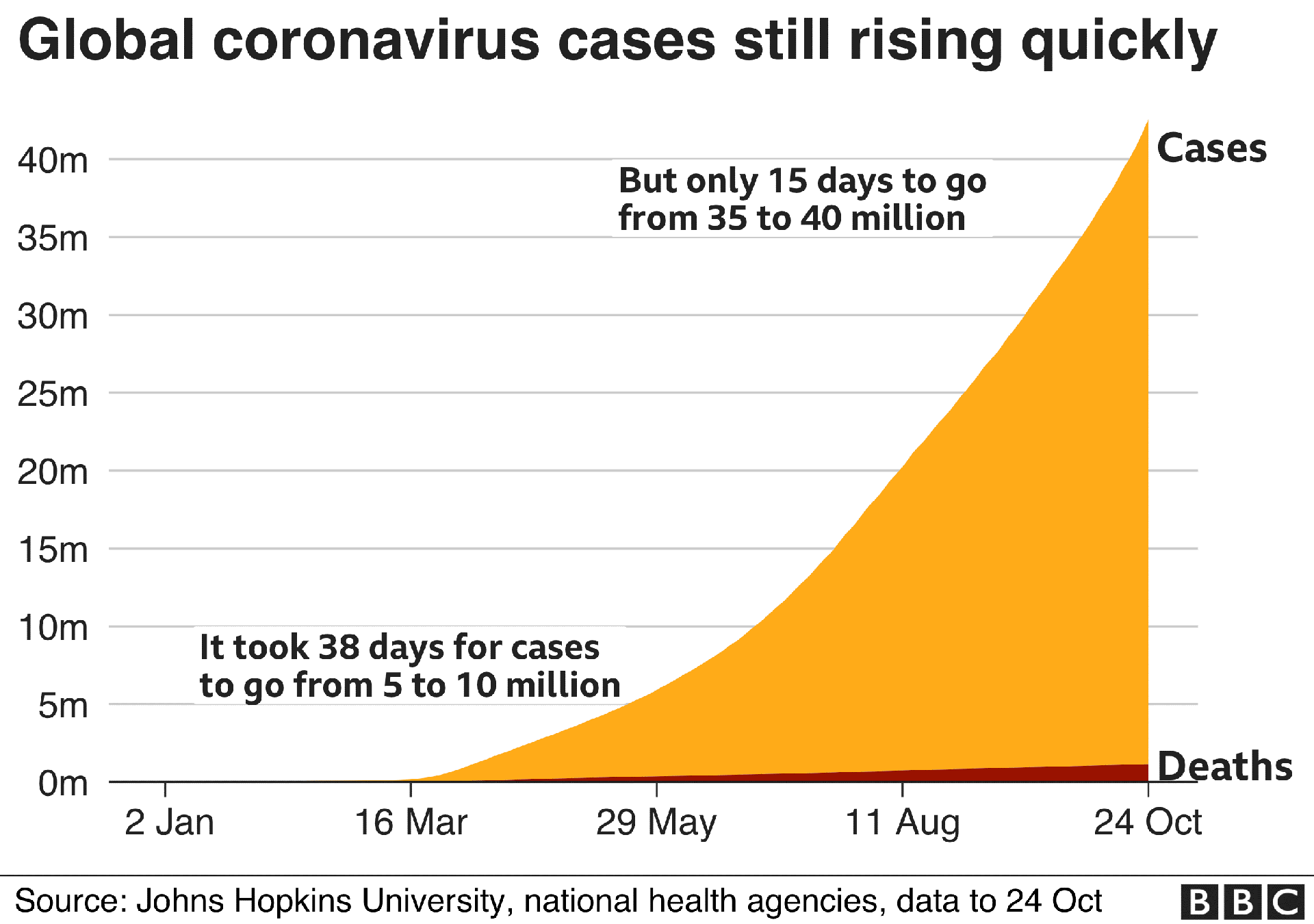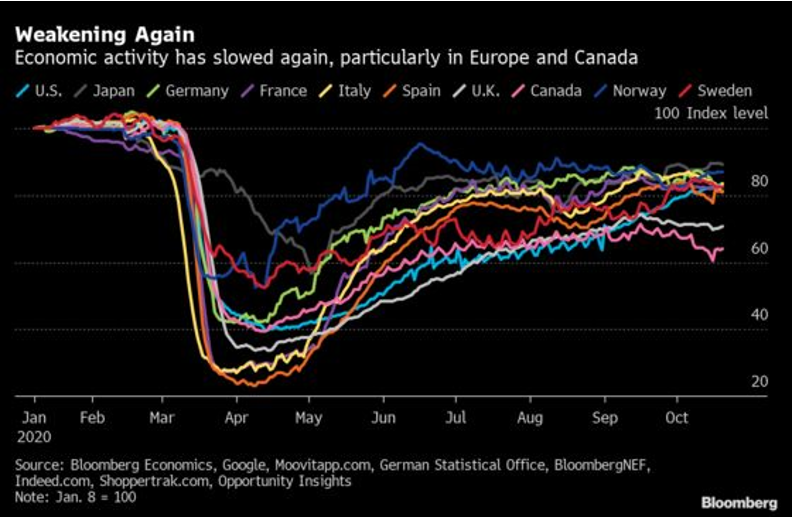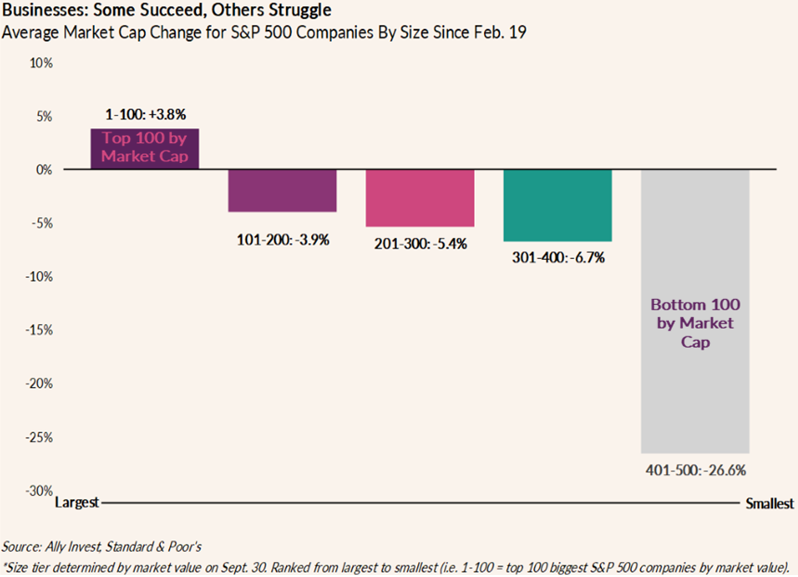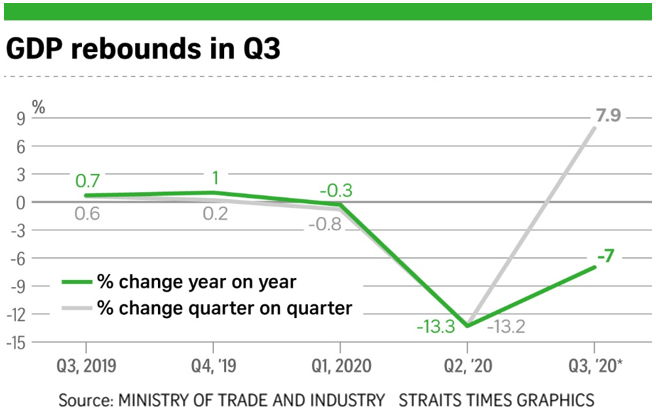|
October effect on investments – fact or fiction? 4 Nov 2020 
The Virus After eclipsing more than 1 million deaths in September, global COVID-19 cases continue to explode and plough through October, exceeding 40 million reported cases in quick fashion.1

While COVID-19 continues to wreak havoc, focus remains cast on infection rates, stricter restrictions and lockdown measures, vaccine hope, and a continuation of accommodative monetary and fiscal policies. Globally, uncertainty continues to stem from Brexit talks, the US presidential election and escalating trade tensions. A successful COVID-19 vaccine remains the biggest hope for global economic recovery and normalisation. According to the WHO, 44 vaccine candidates are currently being clinically evaluated.28
Latest IMF forecasts In its October reports, the International Monetary Fund (IMF) eased its 2020 global GDP contraction forecast to 4.4%, an improvement from June forecasts. The IMF expects national debts to reach 125% of GDP in advanced economies and 65% of GDP in emerging markets by 2021, and highlighted geopolitical tensions, trade friction, natural disasters, changes to financing conditions and further outbreaks as continued risks to the economy and its projections.2
Suppressed economic activity on bouts with COVID-19, deteriorating labour market indicators, dwindling consumer confidence, and trade tensions upending a trade-led recovery and hitting trade-dependent Asian countries forms the backdrop for IMF’s projections.3

Notwithstanding the gloomy forecasts, IMF remains sanguine that GDP growth will march into positive territories in 2021. Global GDP growth expectations for 2021 is set at 5.2%, with advanced economies and, emerging and developing markets are projected to grow 3.9% and 6% respectively.4
United States While the S&P500 treads in green territory year-to-date, much of that recovery has been captured by the handful of mega-cap technology stocks – Apple, Amazon, Microsoft and Alphabet. The turbulent undercurrent lies beneath the tranquil waters stoked by these largest gainers, as smaller companies shrink in successive magnitudes.6

Increased regulation for technology stocks A report released by the House of Democrats alleged US technology giants Amazon, Apple, Facebook and Google of a range of anticompetitive practices – acting as gatekeepers, stifling competition, charging excessive fees and eroding democracy – and suggested drastic measures to rein in the companies’ powers over other market participants and to overhaul antitrust laws to foil mergers and acquisitions that threaten healthy competition.7 However, the acute measures have been contested over concerns that potential overregulation of the technology industry could create negative externalities that would impact the entire economy.22
Unemployment benefit claims and jobless claims continue to rise on the face of continual layoffs. Unadjusted claims for Pandemic Emergency Unemployment Compensation, capturing individuals requiring relief beyond state aid and into federal aid, surged to 2.78 million in September. Continuing claims, however, which captures individuals still receiving unemployment benefits, trended lower.5
Europe Business activity in the Euro zone fell in October as new infections and curbs nestled into the region. As a second wave of COVID-19 gripped the Euro zone, nearly 90% of economists polled by Reuters believe that there is a high risk that the economic recovery will be halted.8
Spain and France have both surpassed the unfortunate milestone of over 1 million confirmed COVID-19 cases.23 The flash Euro zone PMI dropped to 49.4 in October, down from September’s 50.4 reading, further stoking fears of a double-dip recession.9 To add salt to the wound, more than half of Europe’s small and medium enterprises are expecting to shut in 2021 if revenues remain subdued.27
The challenges that the euro zone is facing in the wake of the pandemic are putting additional pressures on the European Central Bank. Economists are largely expecting the ECB to enhance its bond-buying program in December, bolstered by the ECB’s commitment to step up monetary stimulus as needed in the last meeting.24
Brexit talks Bogged by a resurgence in COVID-19 infections, tightening restrictions, uncertain future trade conditions, business resilience is chipped away as days go by. A swift deal, alongside a containment of the virus, is likely the most effective way to support recovery across Europe.
Negotiations over Brexit continue to intensify as UK and EU exchanged tough stances.25 UK prime minister Boris Johnson had demonstrated a willingness to walk away from negotiations in the absence of a deal, warning UK firms to prepare for a no-deal Brexit come year-end.10
After stalling yet again over Brexit’s exasperation that the EU is not compromising, UK and EU are set to realign on trade talks to an eventual deal, and hinted at delivering a deal by mid-November. Without a trade deal, consumers and businesses will face the cost and disruption of tariffs and quotas in just 10 weeks' time when the post-Brexit transition period expires on 31 Dec.25
United Kingdom UK’s trade negotiations outside of the EU proved more fruitful, coining its first agreement with a major economy in the signing of a trade deal with Japan in October. The deal is a significant milestone and paves the way for the newly independent country to join the Trans-Pacific Partnership (TPP) – a trade bloc consisting of 11 countries.11
UK inflation accelerated in September, with the consumer price index (CPI) coming in at 0.5%.13 Still a far cry below the BoE’s long-term inflation target, forecasters are predicting that the Monetary Policy Committee will keep UK’s interest rate unchanged at 0.1% at the 5 November 2020 meeting, but expect the Central Bank’s bond buying programme to be expanded to further stimulate growth in the economy.12
Asia Growth expectations for Asia worsened in October, with the IMF downgrading the region’s 2020 economic growth to contract 2.2%, 0.6% down from its June forecasts.3 Nevertheless, the IMF does expect an economic rebound to almost 7% in 2021, eclipsing growth projections for both advanced, and emerging and developing economies.14
China China’s GDP grew 4.9% in Q3 from a year ago, a recovery story unmatched by other COVID-19 beleaguered economies.15 The country’s recovery has been fuelled by a boom in infrastructure, real estate investments and exports to meet global demands for work-from-home technology, medical and protective equipment. The outlook is bright for China, as the IMF forecasts the country’s economic expansion to accelerate to 8.2% in 2021.3
Despite the signals of a robust economic rebound, the tourism, education and travel industries of the services sector continue to suffer. Like several other major economies, China also continues to grapple with unemployment and rising corporate and household debt. Much will also depend on how relations with the US will evolve after November's presidential election, while trade frictions could also further upend the recovery in exports.15
US-China Trade Tensions Dark clouds are forming as the two powerhouses exchange tariffs and sanctions to safeguard national interest. Following strategic US bans and restrictions on China’s key industries – particularly the technology and semiconductor space – China is retorting with its own ‘unreliable entities’ list and newly instated export laws.17
The ‘unreliable entities’ list targets foreign firms violating normal market transactions in China or taking discriminatory actions against Chinese companies, with firms on the list potentially banned from investing, importing or exporting in China, and possible restrictions or fines on workers of such companies.16 A newly inaugurated export law will take effect on 1 December and will give the government leverage against nations unfairly imposing export controls against China’s interests.17
Vietnam Vietnam has been a significant beneficiary of the diversification of operations out of China, following US-China trade tensions and concerns of global supply chain’s overreliance on China exposed amidst COVID-19’s initial outbreak in China.
The rising lower middle-income country boasts friendly foreign direct investment policies, inexpensive labour, a stable political and business environment, and is strategically placed with ports connecting the South China Sea and Pacific countries, and the joint between northeast and southeast Asian countries. With a young demographic where more than two-thirds of population is below 35 years of age, Vietnam possesses potential for economic growth.18
The fast-growing country may have handled the pandemic with swift success but is not immune to the effects of the pandemic. The country’s tourism has contracted nearly 50%, with factories in trade-dependent primary industries retrenching workers as export slows on a dwindled global demand. Economic growth is projected to slow to 2-3% in 2020, down from last year’s 7.02%. Vietnam is also not spared from US’s protectionist rhetoric. The country’s ballooning trade surplus of nearly $35bn with the US has prompted tariff threats and an ongoing inquiry into Vietnam’s currency policy.19
Singapore Singapore’s economy rebounded in the third quarter with Q3 GDP rising 7.9%, abating the economy’s year on year contraction from 13.3% at the end of Q2 to 7% in the latest quarter. However, the Ministry of Trade and Industry's (MTI) GDP forecast for 2020 still points to a 5-7% contraction.20 
In October, the Monetary Authority of Singapore (MAS) extended multiple relief measures into 2021, giving firms longer periods to resume full loan repayments and easing cash flow difficulties for individuals and enterprises.26 On the fiscal front, the Singapore government has also set aside S$100 billion to cushion the blow for businesses and stave off unemployment.21
As a sweeping resurgent of COVID-19 takes hold across the globe, stricter restrictions and potential lockdowns remain a key risk to the global economic recovery. Volatility is expected as the US presidential election and Brexit deal unfolds, while attention continues to pan towards fiscal and monetary policies around the world as markets look for glimmers of hope to a global economic recovery.
A mixed bag of slumping and recovering economies, much like market volatility, presents pockets of opportunities. As future market returns can be anyone’s guess, and as Main Street and Wall Street diverge, it is both wise, and unwise not to participate in the markets. It all boils down to your risk preference, liquidity needs and investment objective. Low risk, low reward. No risk, no reward. Whether the October Effect is fact or fiction, it is definitely not the only myth out there as you may have missed opportunities for gains had you stayed invested as with any other months of the year.
If you are not confident of timing the market, one good way is to invest in smaller tranches or set up a Value Averaging Plan (VAP) on dollarDEX to smooth out the volatility and help you to focus on your long term goals while taking the emotions out of investing. Read more about VAP through our article “Dollar value averaging: the superior cousin of dollar cost averaging”
At the same time, it is also important for you to do your own research before you invest and rebalance your portfolio to ensure it is diversified, avoiding any concentration risk in a particular sector or region. If you are new to investing and don’t know what to invest in, another good way to start is through our customizable investment portfolio that has the projected returns you need within your risk tolerance.
YOU MAY ALSO LIKE THIS
Sources:
1. https://asia.nikkei.com/Spotlight/Coronavirus/Coronavirus-Free-to-read/Coronavirus-latest-Global-infections-surpass-43m 2. https://www.cnbc.com/2020/10/13/imf-world-economic-outlook-2020-amid-coronavirus-crisis.html 3. https://www.cnbc.com/2020/10/22/imf-trims-2020-asia-outlook-citing-contractions-in-india-philippines-malaysia.html 4. https://www.imf.org/en/Publications/WEO/Issues/2020/09/30/world-economic-outlook-october-2020 5. https://finance.yahoo.com/news/jobless-claims-coronavirus-unemployment-week-ended-october-10-2020-183353138.html 6. https://www.marketwatch.com/story/us-corporate-earnings-reports-will-shine-a-light-on-the-uneven-playing-field-in-the-year-of-the-pandemic-2020-10-09 7. https://www.cbsnews.com/news/amazon-apple-facebook-google-house-report-recommends-restructuring-restricting-acquisitions-antitrust-laws/ 8. https://finance.yahoo.com/news/graphic-testing-times-five-questions-060500433.html 9. https://www.cnbc.com/2020/10/23/euro-zone-economic-activity-shrinks-again-as-covid-second-wave-surges.html 10. https://uk.finance.yahoo.com/news/brexit-firms-preparations-uk-government-advice-103259466.html 11. https://uk.finance.yahoo.com/news/u-k-set-sign-japan-213000074.html 12. https://uk.finance.yahoo.com/news/bank-of-england-andrew-bailey-negative-interest-rates-group-of-thirty-074209112.html 13. https://uk.finance.yahoo.com/news/inflation-ons-september-consumer-price-index-060811925.html 14. https://www.bbc.com/news/business-54626025 15. https://finance.yahoo.com/news/china-rebound-helps-stabilize-shattered-210000580.html 16. https://uk.finance.yahoo.com/news/china-us-trade-war-economy-foreign-firms-140207768.html 17. https://finance.yahoo.com/news/china-us-trade-war-exports-technology-national-security-trump-xi-jinping-164704638.html 18. https://www.asiatimesfinancial.com/vietnam-cashes-in-on-china-exodus 19. https://www.bloombergquint.com/global-economics/apple-s-shifting-supply-chain-creates-boomtowns-in-rural-vietnam 20. https://www.straitstimes.com/business/economy/singapore-economy-rebounds-by-79-in-q3-from-previous-quarter-year-on-year-gdp-down 21. https://www.straitstimes.com/business/economy/spore-economy-faces-deep-scarring-from-pandemic-says-mas-chief 22. https://buck.house.gov/sites/buck.house.gov/files/wysiwyg_uploaded/Buck%20Report.pdf 23. https://www.euronews.com/2020/10/21/coronavirus-spain-becomes-first-country-in-western-europe-to-hit-1-million-covid-19-cases 24. https://www.bloomberg.com/news/articles/2020-10-20/ecb-s-lagarde-says-virus-resurgence-is-a-clear-risk-to-economy 25. https://www.bloomberg.com/news/articles/2020-10-21/brexit-talks-set-to-restart-with-aim-of-deal-by-mid-november 26. https://www.straitstimes.com/business/loan-repayment-relief-measures-for-individuals-smes-extended-into-2021-mas 27. https://www.mckinsey.com/industries/public-and-social-sector/our-insights/covid-19-and-european-small-and-medium-size-enterprises-how-they-are-weathering-the-storm# 28. https://www.bbc.com/news/world-us-canada-54670386
Disclaimer
All information here is for GENERAL INFORMATION only and does not take into account the specific investment objectives, financial situation or needs of any specific person or groups of persons. Prospective investors are advised to read a fund prospectus carefully before applying for any shares/units in unit trusts. The value of the units and the income from them may fall as well as rise. Unit trusts are subject to investment risks, including the possible loss of the principal amount invested. Investors investing in funds denominated in non-local currencies should be aware of the risk of exchange rate fluctuations that may cause a loss of principal. Past performance is not indicative of future performance. dollarDEX is affiliated with Aviva but dollarDEX does not receive any preferential rates for Aviva products as a result of this relationship. Unit trusts are not bank deposits nor are they guaranteed or insured by dollarDEX. Some unit trusts may not be offered to citizens of certain countries such as United States. Information obtained from third party sources have not been verified and we do not represent or warrant its accuracy, correctness or completeness. We bear no responsibility or liability for any error, omission or inaccuracy or for any loss or damage suffered by you or a third party (including indirect, consequential or incidental damages) arising in any way from relying on this information.
This information does not constitute an offer or solicitation of an offer to buy or sell any shares/units.
Information is correct as of 04/11/2020.
|




